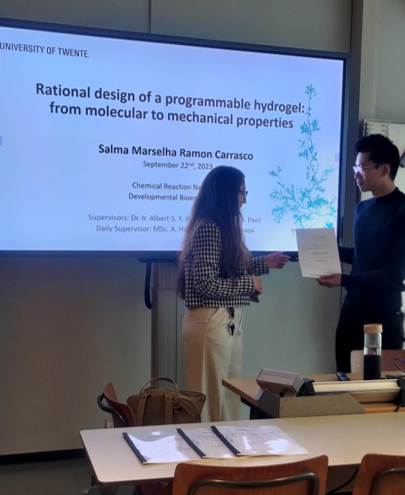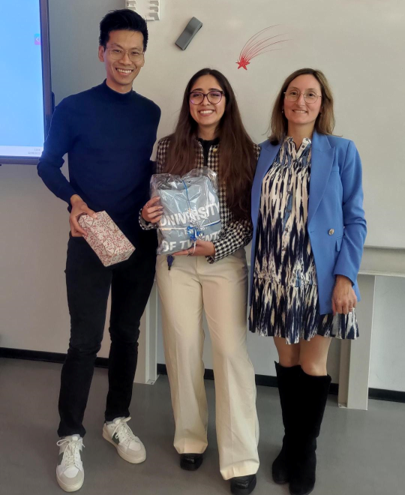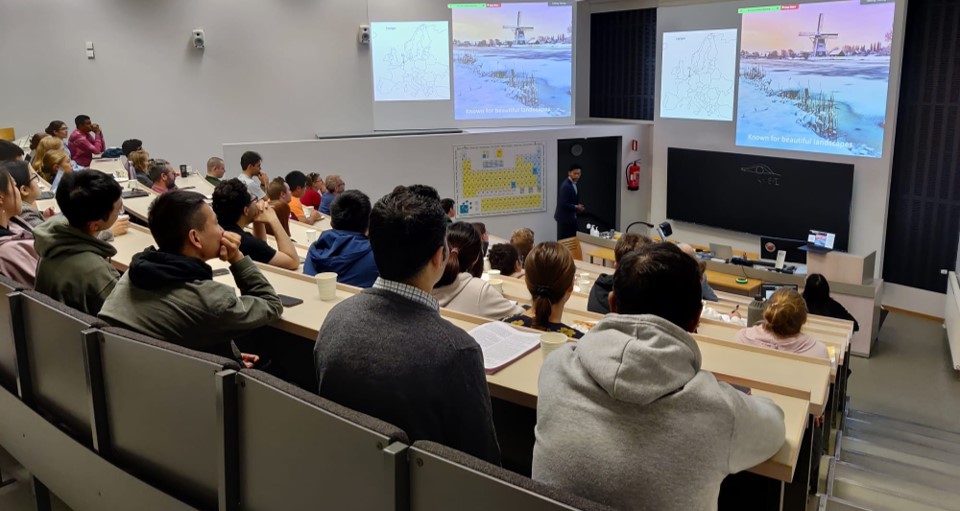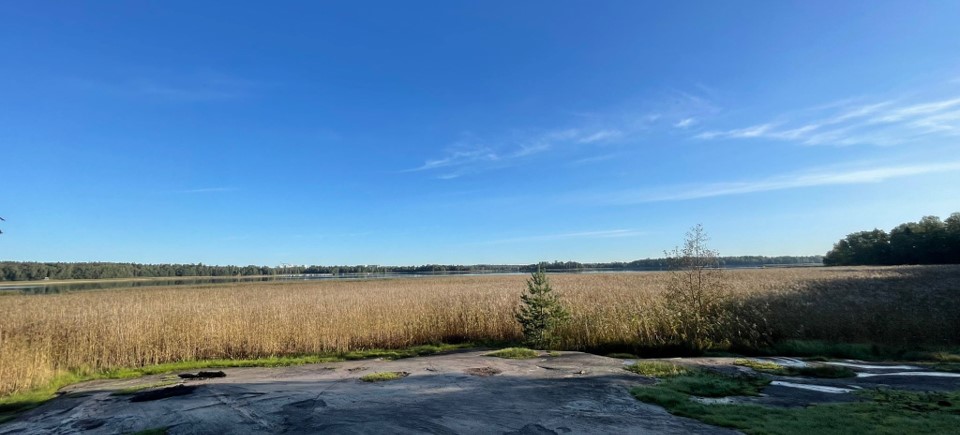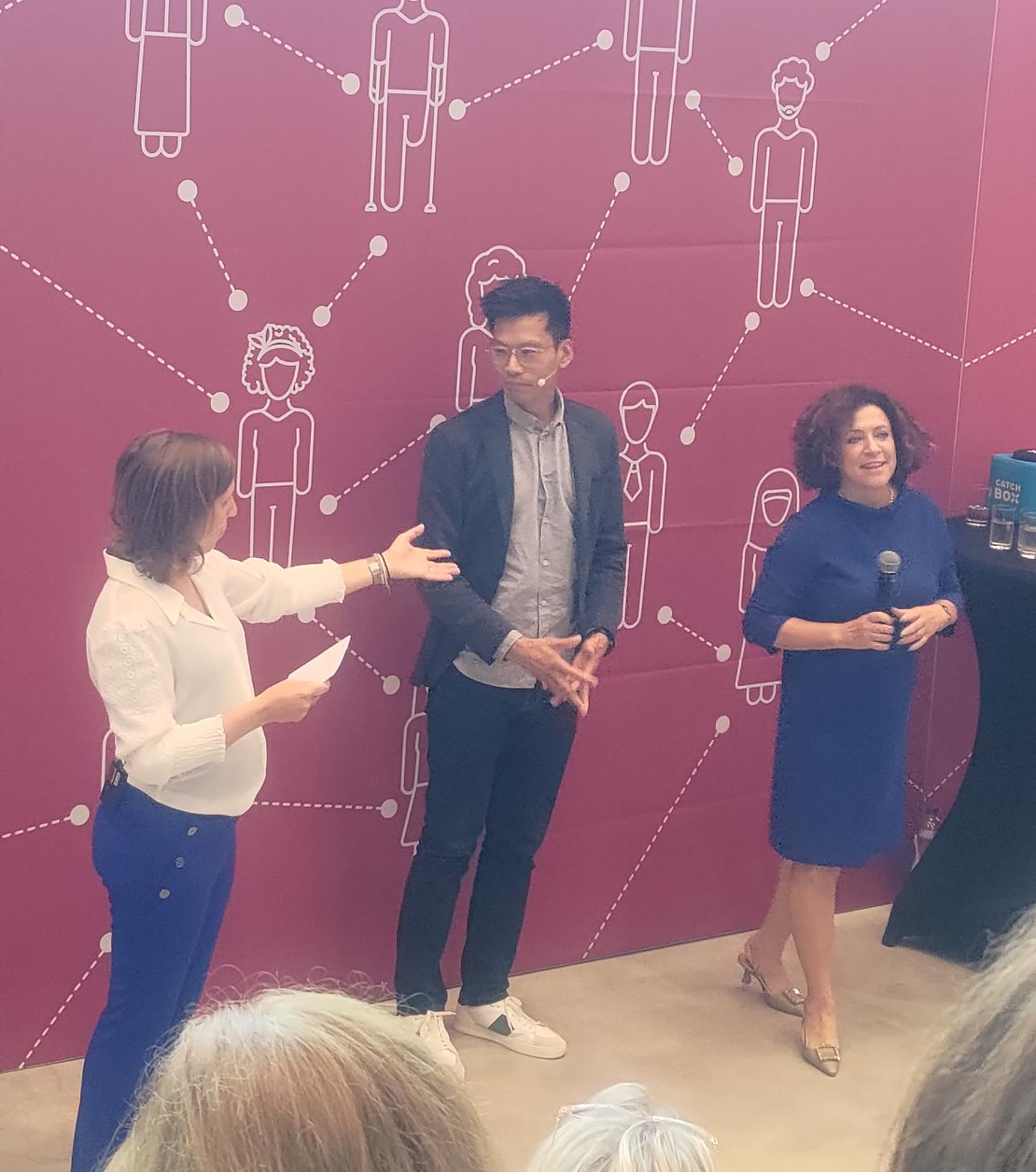WELCOME TO THE CRN LAB | The CRN lab is established in 2020 and is part of the Department of Molecules and Materials (MOLMAT) at University of Twente. |
| My name is Albert Wong. I aim to create an environment that fosters creativity and enthusiasm for science. My core activities center around lecturing chemistry courses (biochemistry, systems chemistry, nanochemistry, organic chemistry, and physical organic chemistry) and leading our research in exploring the rich dynamics of CRNs. Besides, I (co-)organise PhD courses at the UT and (inter)national symposia/conferences, and build a network of young academics as former board of the Young Academy Twente. |
WE AREresearchers with diverse backgrounds in Chemistry, Chemical Engineering, Computational Physics and Mathematics. We share a fascination for the idea that chemical reaction networks operate in harmony to govern living systems. Please check our team page for our members. [photo; Team building, Deventer, 2023] |
|
OUR GOALDesign chemical reaction networks (CRNs) capable of neuromorphic computing. |
OUR APPROACHWe work on three synergistic research directions in the CRN lab to understand how CRNs can memorize and process molecular information. |
Join uS?Visit our vacancies page for possible interest. |
NEWS |
July 20, 2025 | OUTREACH | Albert Wong will present at Zwarte Cross "Molecules with Rhythm". Universitent, in de Schans, Lichtenvoorde Information to be added |
July 7-11, 2025 | RESEARCH | Albert Wong will organize the first KCV Summit: Next-Generation Leaders in Dutch Chemistry, Leiden. Information to be added |
July 4, 2025 | RESEARCH | Hazal Koyuncu will defend her PhD thesis. Information to be added |
June 6, 2025 | RESEARCH | Albert Wong received funding from Knowledge and Innovation Covenant (KIC) program of the Dutch Research Council (NWO). |
June 4, 2025 | OUTREACH | Albert Wong will present at TEDx "Hedonism in Chemistry". 18:15 at Harry Banink theater at Saxion, Enschede. Information to be added |
June 4, 2025 | EDUCATION | The educational initiative CLEAR: Chemistry Learning for Environmental Action and Responsibility at the University of Twente has been nominated for the Dutch Education Award 2025. The prize is the highest national award for educational innovation in senior secondary vocational, higher vocational and scientific education. |
May 28, 2025 | RESEARCH | Our paper on Coupling Synthetic Negative Feedback Loops is accepted in Chem. Information to be added |
May 20, 2025 | VACANCY | New PhD position available. Information to be added |
May 2, 2025 | RESEARCH | Nikita Ivanov graduated in the Huck lab. Information to be added |
April 1, 2025 | RESEARCH | Dmitrii Kriukov graduated as first PhD in the CRN lab. Information to be added |
January 16, 2025 | RESEARCH |
|
December 6, 2024 | RESEARCH |
NWA Research grant awarded for a consortium named "PRELIFE-Pathways, Reactions, and Environments leading to LIFE". In this interdisciplinary research consortium, led by Professor Inge Loes ten Kate (Utrecht University), Albert Wong will collaborate with Rick Quax (University of Amsterdam) to develop a so-called hypergraph model for chemical reaction networks. The consortium is part of the Origins Center and consists of scientists from sixteen universities and research institutes across the Netherlands, along with experts in science communication and education. The interview with Albert Wong by UToday can be found here. |
December 3, 2024 | RESEARCH |
|
November 4, 2024 | EDUCATION | Pepijn de Vries defended his Msc thesis entitled "Controlling the Bistability of a Trypsin-Based Enzymatic Reaction Network". Pepijn successfully completed a project in which he determined how exactly La3+ can dictate the autocatalytic prodcution of trypsin from trypsinogen, impacting the chemical feedback directly. This work is a continuation of our recent published with Dmitrii Kriukov, who supported this project as daily supervisor. Pepijn graduated as a Master in Chemical Science & Engineering. |
September 27, 2024 | RESEARCH |
Check out our work for more information. The relevance of this work to general audience is evidenced by media coverage in four national (C2W-Mens&Milieu, DeIngenieur, NewScientist, and Nationaleonderwijsgids) and five international news outlets (Phys.org, EngineersOnline, inovacaotecnologica, Nanowerk, and M2PressWIRE). |
September 20, 2024 | RESEARCH | Our paper (#14) on "Molecular Information Processing in a Chemical Reaction Network using Surface-Mediated Polyelectrolyte Complexation" is published in ChemSystemsChem. Many congratulations to Hazal Koyuncu and Taghi Moazzenade, as well as collaborators from the Molecular NanoFabrication group: Giulia Allegri, Jurriaan Huskens, and Saskia Lindhoud. The strategy employed allows for signal modulation encoded in the frequency and duration of pH pulses. Check out our work for more information. |
August 30, 2024 | EDUCATION |
This project has shown that Lieke has all the competencies required for an excellent researcher and teacher. Many congratulations to Lieke for this exceptional work--which was awarded with a 10/10 by the committee--and thanks to Talitha Visser for co-supervision. Lieke graduated cum laude as a Master in Educatie & Communicatie in de Bėtawetenschappen, and will pursue her career as a chemistry teacher. |
July 27, 2024 | PEOPLE | Summer Lunch CRN. Thanks everyone for joining the CRN Summer Lunch. Enjoy the summer! |
July 26, 2024 | EDUCATION |
Thomas graduated as a Master in Chemical Science & Engineering. Thomas demonstrated a unique ability in developing new research at the forefront of chemistry and mathematics. Many congratulations to him for this exceptional work, and thanks to Éverton F. da Cunha and Clara Stegehuis for their supervision. We wish him all the best at Valcon, where he will pursue his career as software engineer. |
July 18, 2024 | EDUCATION |
Many congratulations to Ivanna for this exceptional work, and thanks to Hazal Koyuncu and Nataliya Debera for their help in supervision. Ivanna graduated as a Bachelor in Chemical Science & Engineering. We wish Ivanna all the best at UvA, where she will aim to obtain her MSc degree in biochemistry. |
March 17, 2024 | OUTREACH | Albert Wong lectured on the future in leadership, at the Higher Management Day. The UT is exposed to external threats, including increasing financial deficits, decreasing influx of students, and—moreover—an ever-changing demand of society. In the talk entitled "Flow enables TeamUT", I argue how we as Young Academy Twente (YAT) wish to create a strong base for a shared future; We feel connected, we feel at home, and we are a team at UT. |
February 5, 2024 | PEOPLE | Looking forward to welcome Pepijn de Vries, who will start his MSc on "Understanding and Controlling the stability of steady states in an enzymatic reaction network", working with Dmitrii. |
January 18, 2024 | OUTREACH | Interview at NTR 'De nacht van', broadcasted on Radio 1: "Wil a chemical computer become our future?". Many thanks to Ruben R. Jacobson (chief editor), and Stijn Goosens (presentor, left on image) for hosting me. The interview can be found as video or podcast, with the latter also on Spotify. |
January 5, 2024 | PEOPLE | Lieke Pieters started her MSc thesis on "Preparing students for Conceptueel Modelling in Chemical Sciences". Her research will be conducted from an educational perspective. |
December 28, 2023 | RESEARCH |
The image shows a microfluidic channel with multilayer polylysine surfaces, which provide the potential to bestow an acid-base equilibrium with the capacity of signal transduction. Read the full text of the Research Article at 10.1002/syst.202300030, and our cover profile at 10.1002/syst.202300052. Cover design by Niels van der Velde (University of Twente, NL) |
December 14, 2023 | OUTREACH | Interview with C2W: "Uitzoomen en vooruitkijken: conceptueel modelleren in de klas" highlights our findings in establishing an evidenced-informed learning environment for conceptualizing new ideas! Thank you to Daniël Linzel for interviewing Albert Wong and Leonie Krab-Hüsken. |
December 4, 2023 | PEOPLE | Looking forward to welcome Thomas van Poppel, who will start his MSc on "Integrating the molecular design of CRNs with graph analyses", working with Everton, Dmitrii, and Clara. |
November 27, 2023 | OUTREACH | Interview with UT News: "Facilitating learning chemistry with conceptual modeling" highlights our recently published paper in Journal of Chemical Education. Thanks to Kees Wesselink-Schram for interviewing Albert Wong, Linlin Pei and Leonie Krab-Hüsken! |
November 24, 2023. OUTREACH. Interview with C2W: "If you coat the inside of a microfluidic channel with poly-L-lysine, you can use it to influence signals in chemical reaction networks." A big thank you to Daniël Linzel for the nice words and for interviewing Albert Wong. |
|
November 13-17, 2023. EDUCATION. Our team joined the 2023 MNF Writing week, organized by Albert Wong, together with prof. J. Huskens and Dr. S. Lindhoud. A wonderful week full of creativity! |
|
November 11, 2023 | EDUCATIONAL RESEARCH | Our paper (#13) in Journal of Chemical Education is out! Albert and colleagues designed a new teaching method to establish an evidenced-informed learning environment for conceptualizing new ideas. This method is also applied to foster curiosity in the CRN lab. I enjoyed guiding this unique collaboration involving an education program director, education specialist, learning assistant and four researchers! |
|
October 23, 2023 | RESEARCH | Our paper (#12) in ChemSystemsChem is out! Localized reactions provide the potential to bestow chemical reaction networks with the capacity of signal transduction. This work demonstrates that a microfluidic channel with polylysine-coated surfaces could delay an otherwise fast acid-base equilibrium. Control over the rates of protonation and deprotonation allows for molecular information processing. Many congratulations to Hazal for her first first-author paper. A big thank you to Dr. Jacopo Movilli, Dr. Sevil Sahin, Dmitrii Kriukov, and prof. Jurriaan Huskens for this great team effort!! |
|
October 12, 2023. EDUCATION. Albert Wong and Leonie Krab-Hüsken at the "2023 UT Inspriatiedag" inspiring high-school teachers to use Systems Thinking in chemistry in their classes.
|
|
September 22, 2023 | EDUCATION | Congrats to Salma Ramon Carrasco graduated for obtaining her Msc degree (the MSc of the CRN lab!). A big thank you to Salma for her thesis "Rational design of a programmable hydrogel: from molecular to mechanical properties" which will spark a new research direction for our lab. We enjoyed working with Dr. J. Paez, co-supervisor, on this work. |
|
|
September 14, 2023. RESEARCH. Albert Wong delivered the opening talk of 2023 seminars at Life-Inspired Hybrid Materials, LIBER (2023, Espoo, FIN). "How can chemistry play a role in advancing future materials?" A big thank you to Hang Zhang, as well as Olli Ikalla and Arri for hosting me at Aalto University in wonderful area of Espoo!
|
September 12, 2023. OUTREACH. Albert Wong in a public debate with prof. Tanja Bodnarouk on implementation of Recognition and Rewards at the UT. Thanks to Tanja for a great debat, Jeroen Jansen (chair R&R) for organising this event and Anna Heijker (Nderlands Debat Instituut) for leading the discussion. The aftermovie can be found here. |
September 6, 2023 | RESEARCH | Our paper (#11) with prof. Harutyunyan and others in Nature is out! We discovered that synthetic oscillatory CRNs can display functions beyond that of a pacemaker. This collaborative work combined simulations developed in the CRN lab, flow setup developed in Huck’s lab, and catalysts designed in Harutyunyan’ lab. |
September 5, 2023 | DEFENSES | Taghi Moazzenzade graduated for his PhD, under the supervision of prof. S. Lemay and prof. J. Huskens. Having closed the chapter of his PhD, he is ready and excited to take on his next challenge in the CRN lab as PD, where he will examine how we can incorporate surface-driven CRNs based on DNA into our microfluidic setups. |
September 1, 2023 | EDUCATION | First time Systems Chemistry (MSc course) will taught at the UT. Systems chemistry - a field that creates and studies networks of interacting molecules - emphasizes a molecular approach to conceptualize natural phenomena that can be encountered at various length scales. Here, case studies were provided to allow for discussions on the state-of-the-art in the domains of autonomous molecular materials, out-of-equilibrium chemistry, and more generally natural phenomena with an apparent complexity. Students gained a fundamental understanding in what makes chemistry in a living systems so very different from the chemistry we use in the laboratory. Consequently, they learned that the systems chemistry framework can enable them to disassemble a very broad range of scientific puzzles. |

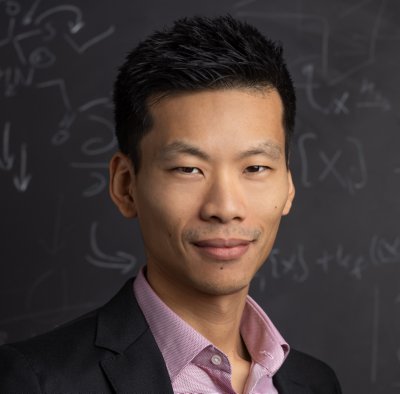
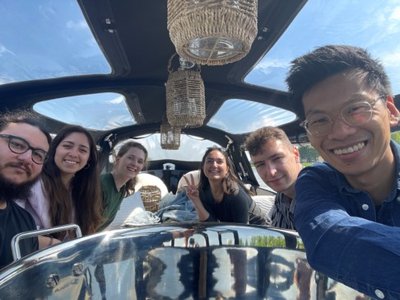
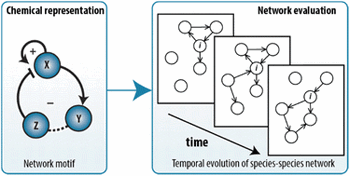 Our paper (
Our paper (
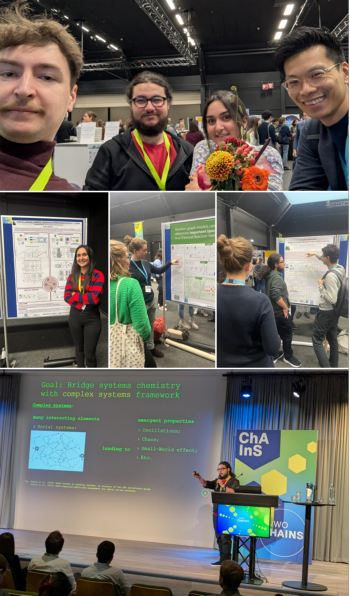 CRN team at CHAINS 2024: Super proud to see Yanna, Éverton, Hazal & Dmitrii all presenting their work, with Éverton also invited to give a talk in the parallel sessions. After the post-covid hybrid (2022) and IUPAC (2023) editions, we finally managed to go to CHAINS as a team for the first time: Always good to be back at Veldhoven to share our enthusiasm for chemistry!
CRN team at CHAINS 2024: Super proud to see Yanna, Éverton, Hazal & Dmitrii all presenting their work, with Éverton also invited to give a talk in the parallel sessions. After the post-covid hybrid (2022) and IUPAC (2023) editions, we finally managed to go to CHAINS as a team for the first time: Always good to be back at Veldhoven to share our enthusiasm for chemistry! Our paper (
Our paper (
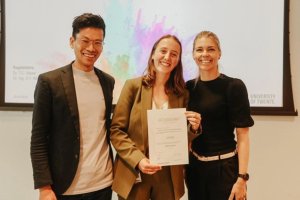 Lieke Pieters defended her Msc thesis entitled "Conceptueel modelleren: De brug naar het systematisch benaderen van scheikundige vraagstukken in het voortgezet onderwijs". Lieke successfully completed an innovative project in which she developed a teaching module that integrates systems thinking into secondary school chemistry education. With this research, Lieke has taken an important step towards preparing the “researchers of the future” to design innovations for an increasingly complex world.
Lieke Pieters defended her Msc thesis entitled "Conceptueel modelleren: De brug naar het systematisch benaderen van scheikundige vraagstukken in het voortgezet onderwijs". Lieke successfully completed an innovative project in which she developed a teaching module that integrates systems thinking into secondary school chemistry education. With this research, Lieke has taken an important step towards preparing the “researchers of the future” to design innovations for an increasingly complex world.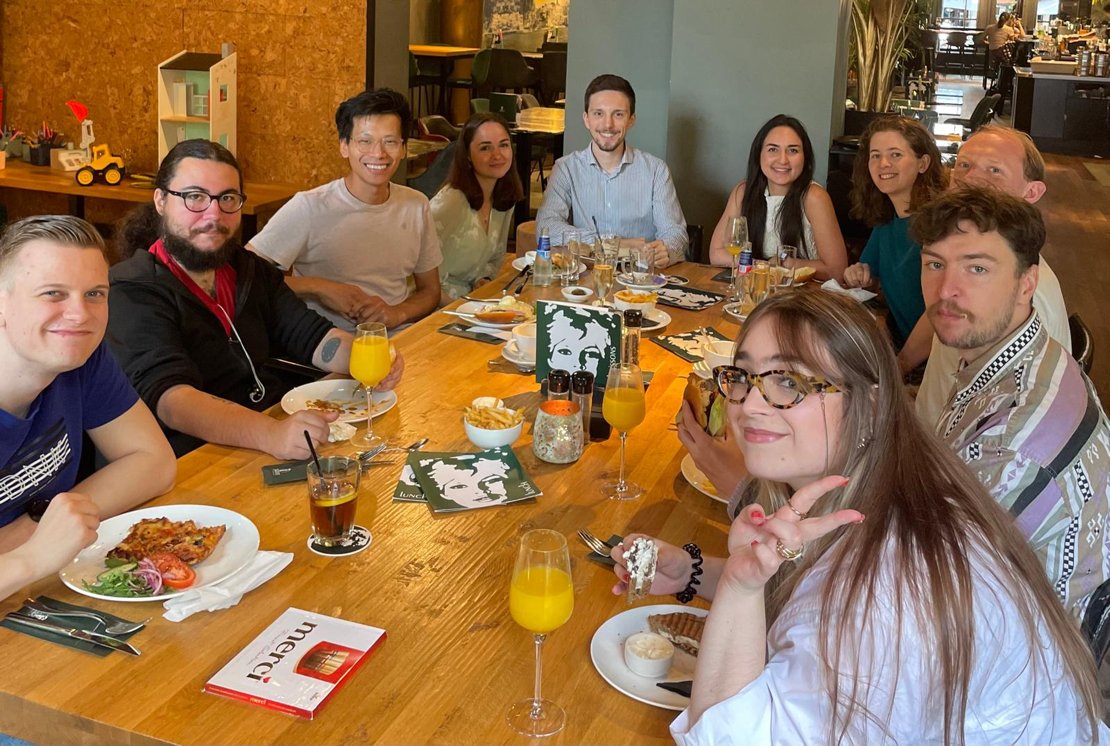
 Thomas van Poppel defended his Msc thesis entitled "Graph-based projections reveal common structures underlying chemical reaction networks". Thomas successfully completed an innovative project in which he developed a computational technique for chemical reaction networks, enabling insights into their structure.
Thomas van Poppel defended his Msc thesis entitled "Graph-based projections reveal common structures underlying chemical reaction networks". Thomas successfully completed an innovative project in which he developed a computational technique for chemical reaction networks, enabling insights into their structure.  Ivanna Vasylkiv defended his Bsc thesis entitled "Controlling thiol-tetrazene interactions in flow". Ivanna successfully completed a project in which she developed a microfluidic approach to determine how thiol-tetrazine exchange reactions could influence larger biochemical processes. She demonstrated to be an excellent team member and obtained skills in peptide synthesis and flow chemistry.
Ivanna Vasylkiv defended his Bsc thesis entitled "Controlling thiol-tetrazene interactions in flow". Ivanna successfully completed a project in which she developed a microfluidic approach to determine how thiol-tetrazine exchange reactions could influence larger biochemical processes. She demonstrated to be an excellent team member and obtained skills in peptide synthesis and flow chemistry. 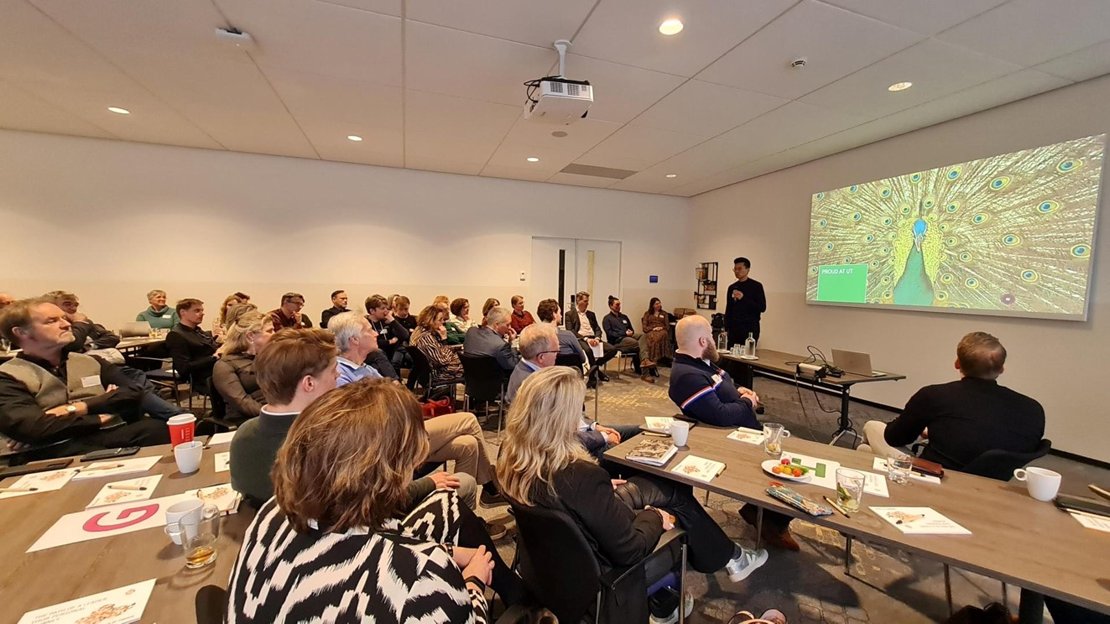

 Our paper (
Our paper (
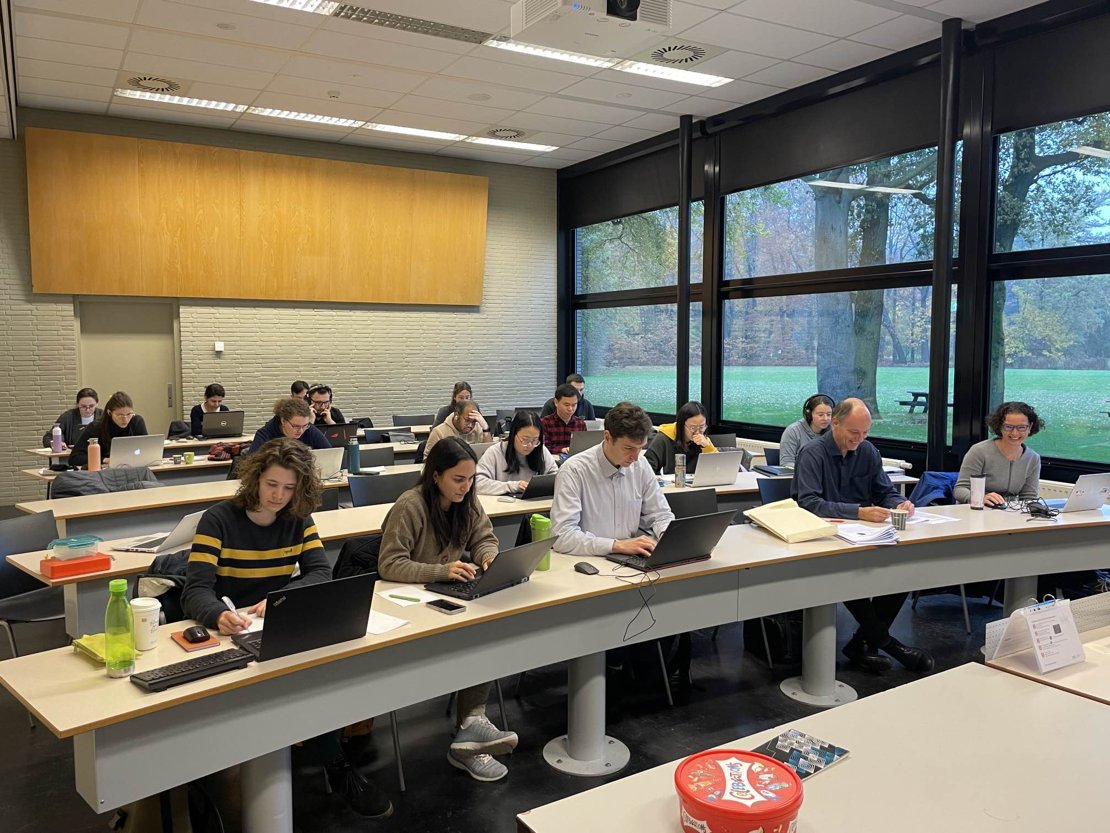
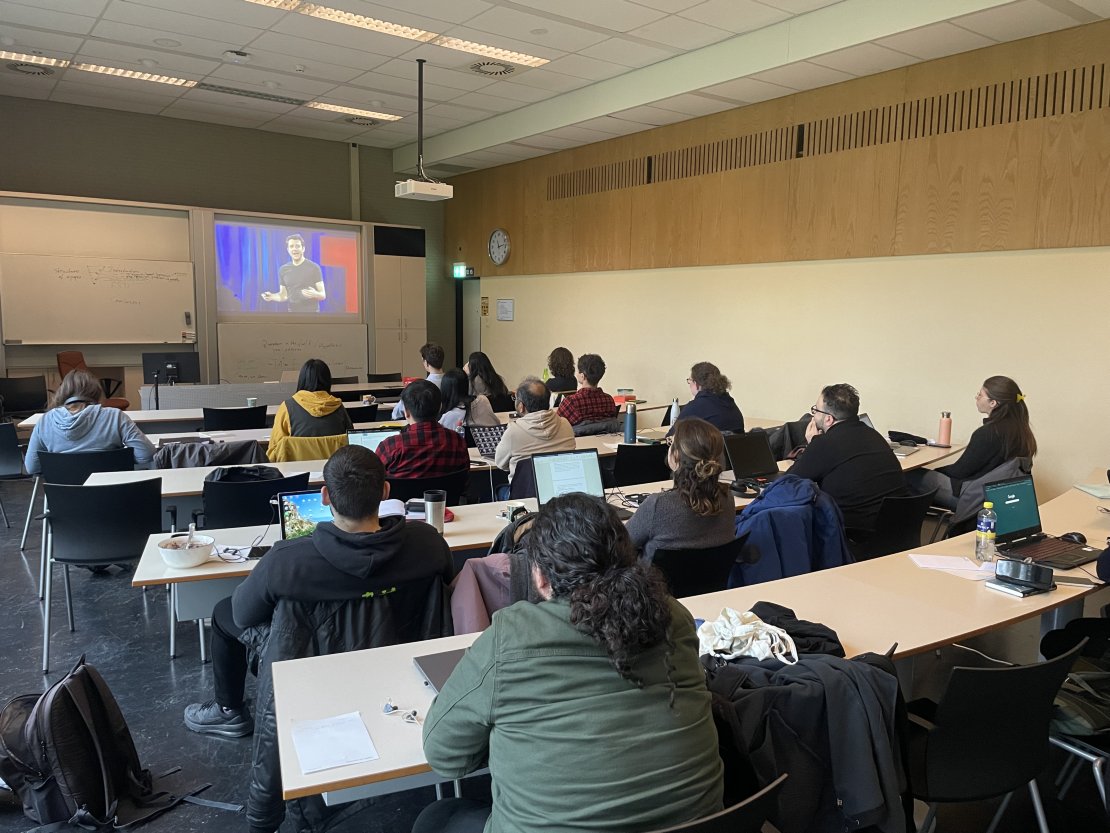
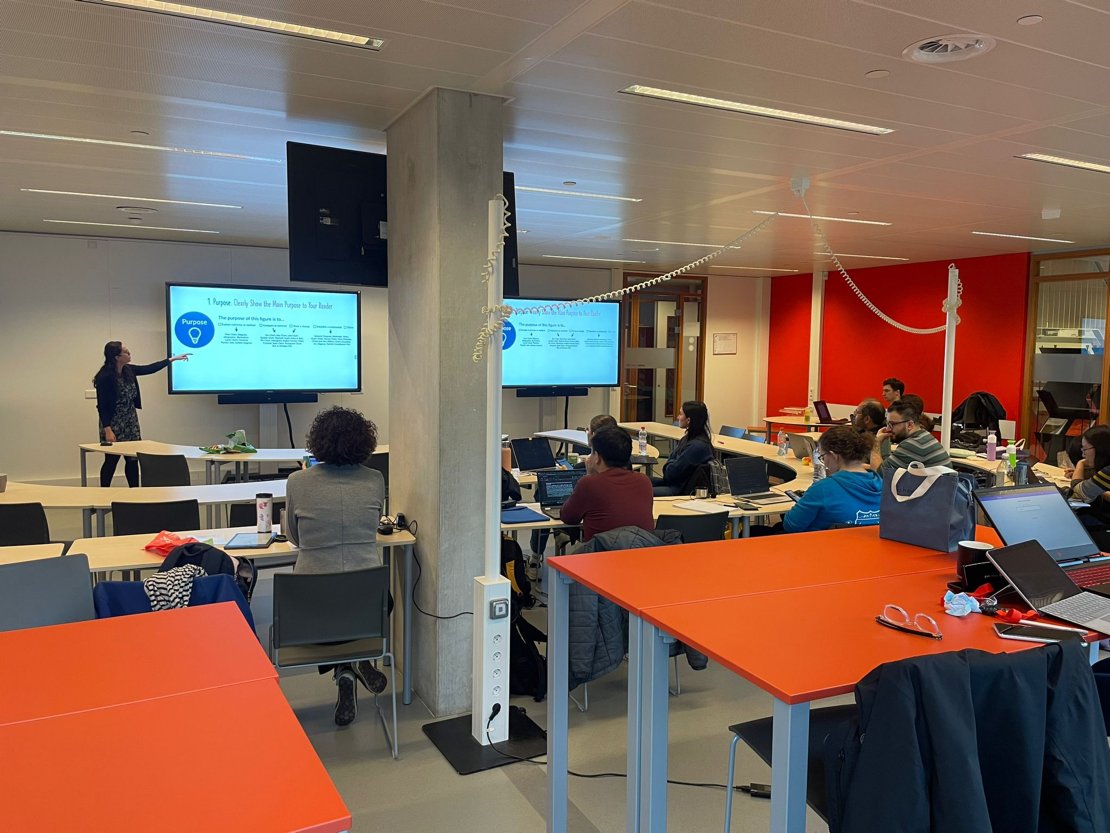


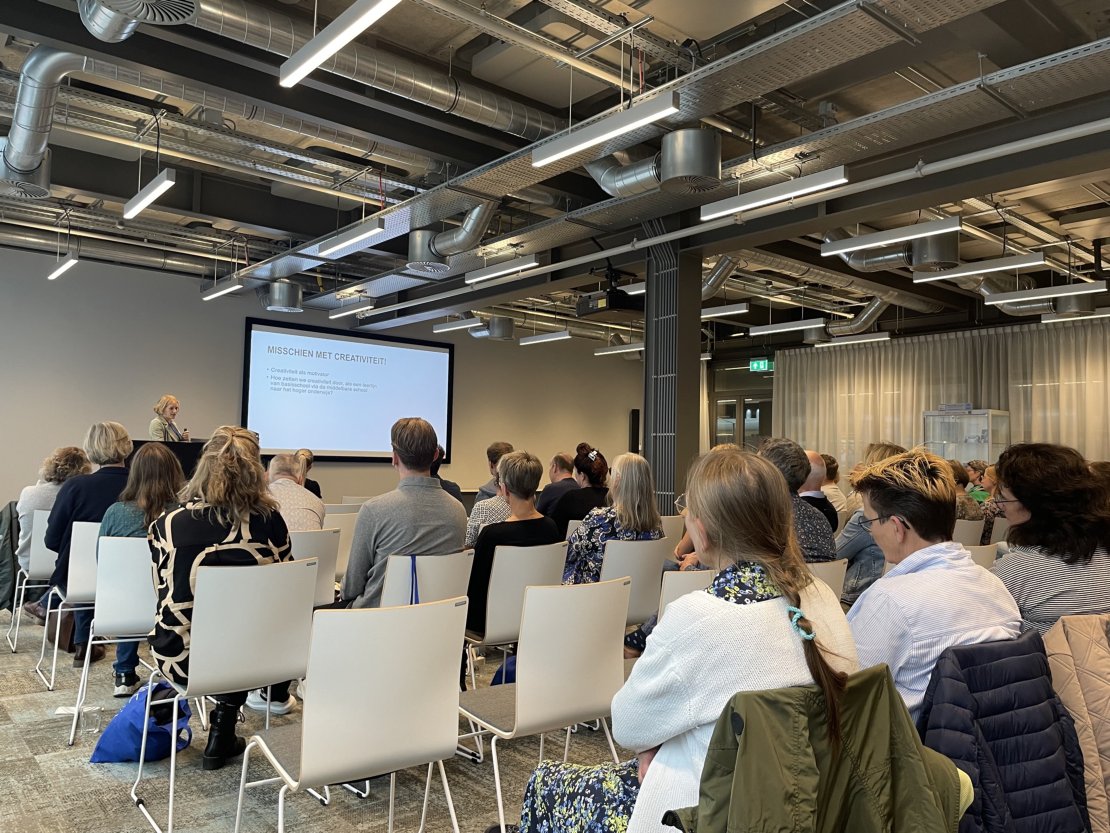
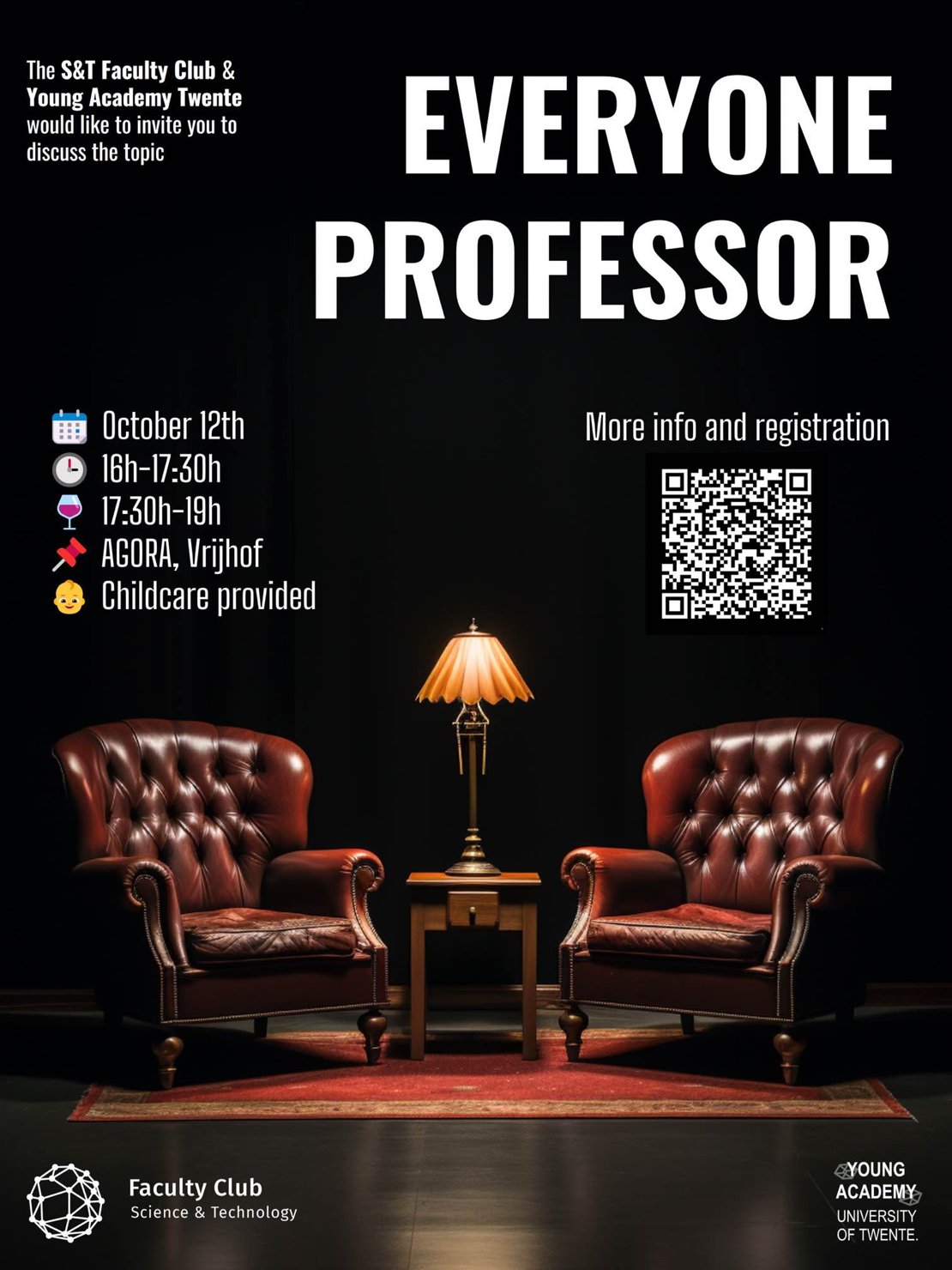 October 11, 2023. OUTREACH. 2023 Iedereen Professor event, organized by the Young Academy Twente (wherein Albert Wong is board member) & TNW Faculty Club.
October 11, 2023. OUTREACH. 2023 Iedereen Professor event, organized by the Young Academy Twente (wherein Albert Wong is board member) & TNW Faculty Club.